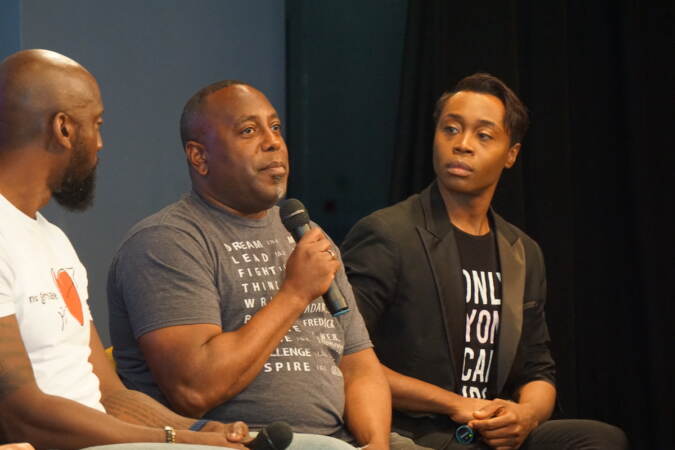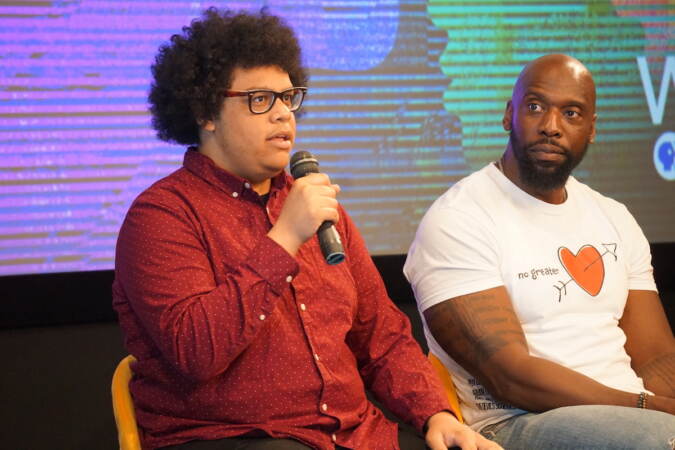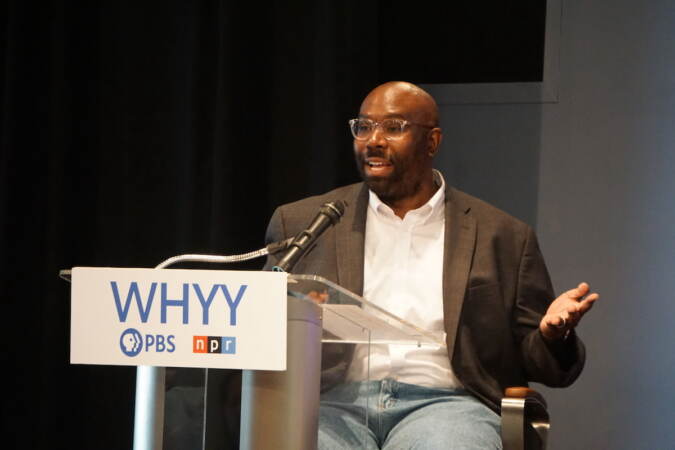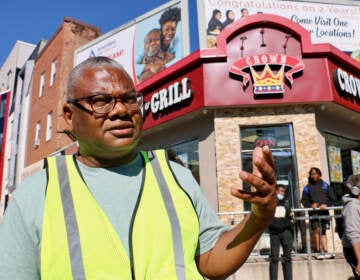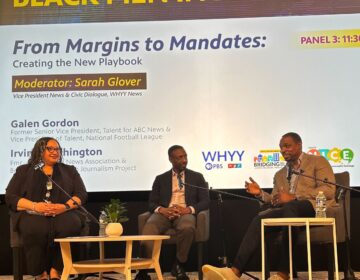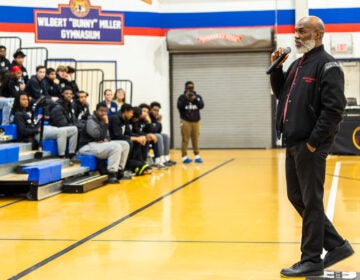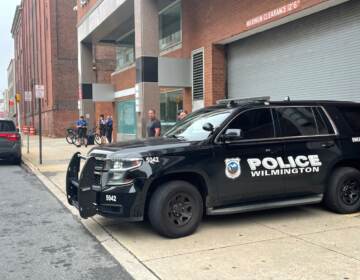Black men in media discuss their success and the power of telling authentic stories
WHYY’s N.I.C.E initiative organized an event to celebrate Black men in media, unpack harmful tropes, and inspire young artists.
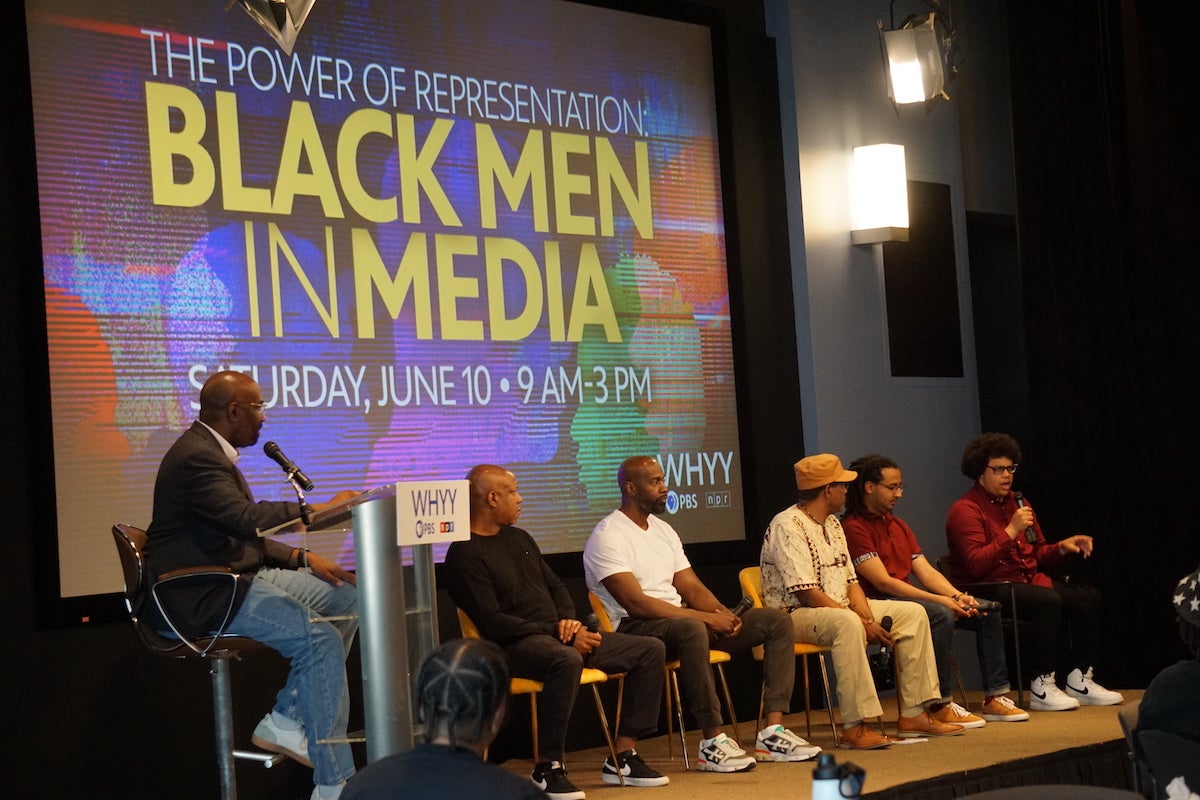
WHYY News' reporter P. Kenneth Burns leads a panel at WHYY News' "The Power of Representation: Black Men in Media" on June 10, 2023. (Sam Searles/WHYY)
Media makers gathered to celebrate Black men in media, and to dialogue about the power of telling authentic stories, representation in media, and how to succeed in the industry at WHYY’s headquarters on Saturday.
The event was organized by WHYY’s News and Information Community Exchange (N.I.C.E.) — a mutual aid, journalism collaborative, and funded by the Knight Lenfest Local News Transformation Fund.
“It’s important for us to remember that young people need to see semblances of themselves in the future,” said Eric Marsh Sr., WHYY’s manager of Community & Engagement. He said the event was meant to highlight successful media careers, and show how self-expression can be joyful and healing.
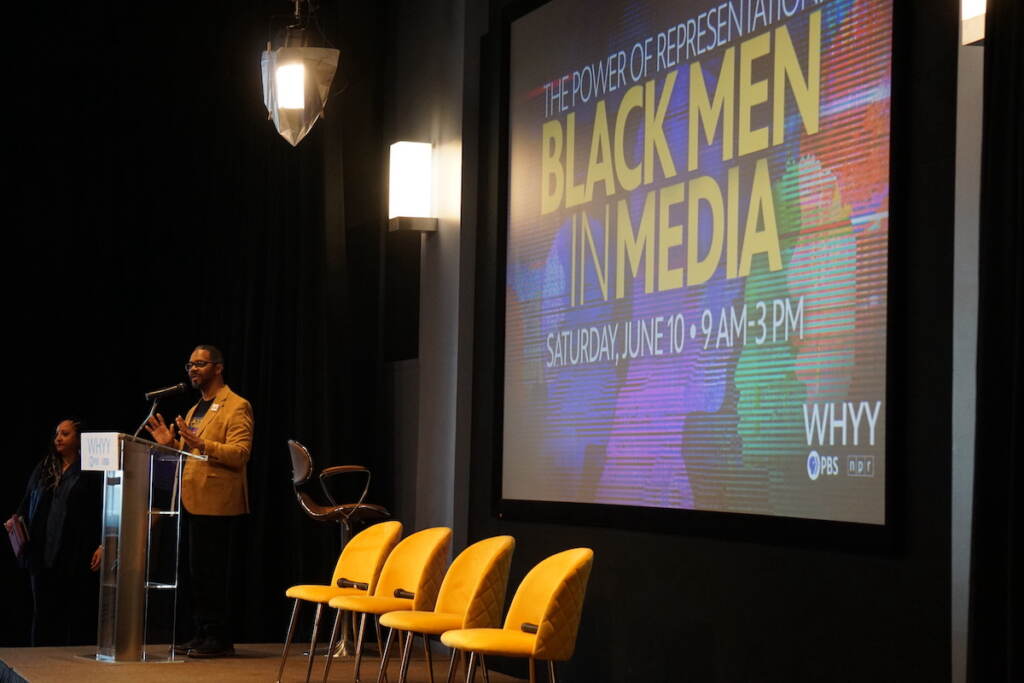
While some of the topics discussed were heavy, young creators in the room also felt inspired by the success of others.
“Hearing everybody’s different experiences really opened my eyes as to what I need to do for my podcast,” said Daniel Corbitt, 27, creator of a new podcast called The Sports Huddle.
Eric “Shomari” Grimes is an activist, educator, and host of the radio show “Groundings with Brother Shomari” on WURD. He said that we need to think beyond just representation if we want to really address disparities in media.
“We are pushing so hard for representation, but we forget to re-imagine. And representation without reimagination leads to the repetition, the reinforcement and the reification of racist representations,” Brother Shomari said.
Shomari said young Black men’s aspirations get damaged when they are surrounded by news coverage and stories predominantly focusing on gun violence and crime.
So what can be done to reshape how stories are told and who gets to tell them?
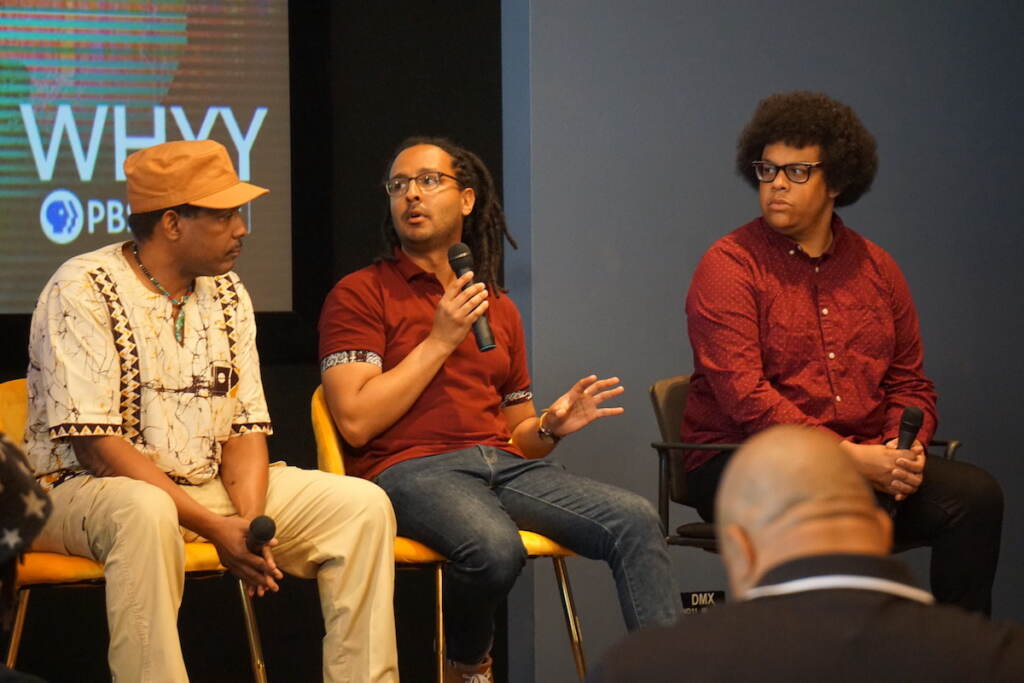
Resolve Philly’s Director of Community Engagement Derrick Cain wanted to re-shape the narrative about him and people like him when he returned home from being incarcerated, so he got a criminal justice journalism fellowship with the People’s Paper Co-op and began to tell his own story.
“No one can communicate our story better than us,” said James Williams, who started his own paper in 2020 called the Uptown Standard, which exclusively tells positive stories about Black men. He said there need to be more Black journalists and publishers to contribute to fuller, more accurate journalism about and for Black communities.
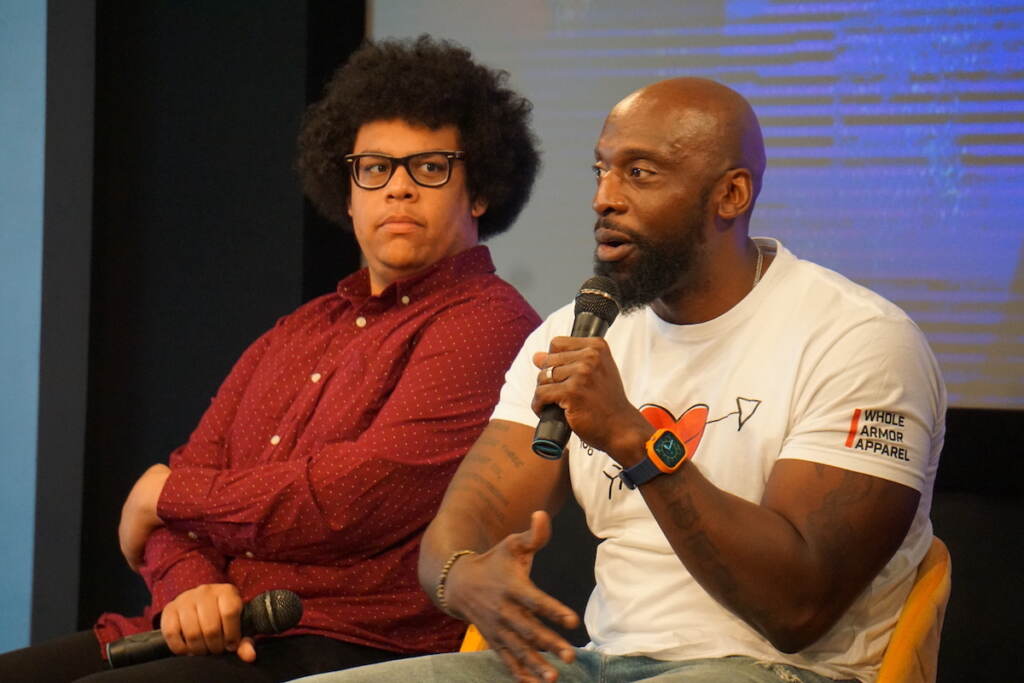
The event also featured Philadelphia-based MyKey Cooper, a 17-year-old actor in Power Book 3, and writer for the Kids Tonight Show. In his keynote speech, he said that young Black men need more outreach, mentorship, and opportunities — seats inside spaces like the WHYY conference — as well as stories they can relate to, so that they can explore career pathways as media makers.
“It takes a village to raise a child, especially a young Black child. We are the village that will allow us to succeed. We are the ones with the advantage. We’re here now,” Cooper said.
Dre’mere Reyes, 18-year-old graduate of WHYY’s Media Lab, Billy Penn freelancer, and Emmy award winning student reporter, was there filming the panels while showing 12-year-old Aaron Edmond Marsh how to use a camera.
Reyes offered advice for young people wanting to break into the media industry. Don’t wait for opportunity to come to you, he said. “You want to find opportunity. So prepare yourself for what’s next,” and find a mentor.
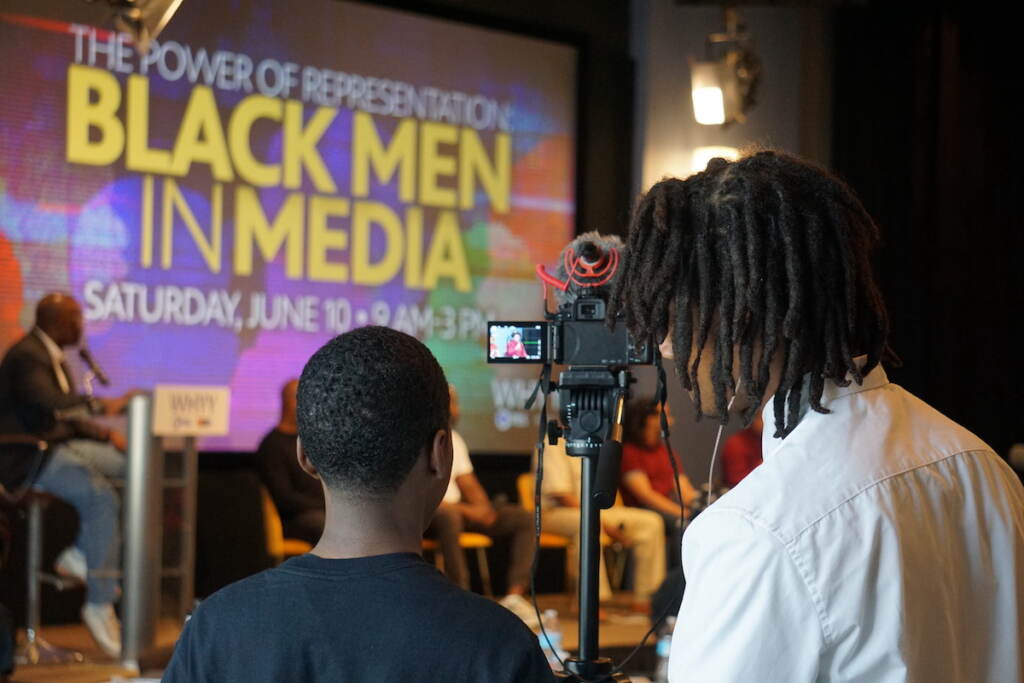
Audience member and filmmaker Elijah Crawford, of Ugly Art Films, asked a panel of artists on how to balance being authentic with the agenda of producers who just want “what sells,” which often plays into harmful tropes.
“Capitalist societies are built on the concept of, you have to keep working, you have to grind to get to a certain point. And when you get to that point, the thing that sells is the exact same thing that’s exploiting us,” Crawford said.
Narrative filmmaker Kaloni Davis said that Black creators need to tell stories that are true to themselves, “the stories that are in us.”
“I think we have to be careful not to put this responsibility on ourselves as Black creators to tell a particular story,” that fits into outsider’s expectations of the “Black experience,” Davis said. “If I’m writing it, it’s the Black experience because I’m Black.”
But ultimately the biggest change, he said, “will come when we become the distributors … When we own the rooms, we can change the narrative.” Philadelphia also needs to invest in infrastructure for artists to thrive, Davis added.
Peabody award winning journalist and educator Chenjerai Kumanyika, co-host of the podcast “Uncivil,” was interviewed by Marsh on his rise to success and perspective on media representation.
Kumanyika said his skills as a reporter were cultivated through hip-hop.
“Hip-hop teaches you how to listen,” he said. In a hip-hop battle, “You gotta listen to what the person is saying on multiple levels. You gotta catch the metaphors. You gotta assess the limitations. This is also what a journalist has to do,” Kumanyika said.
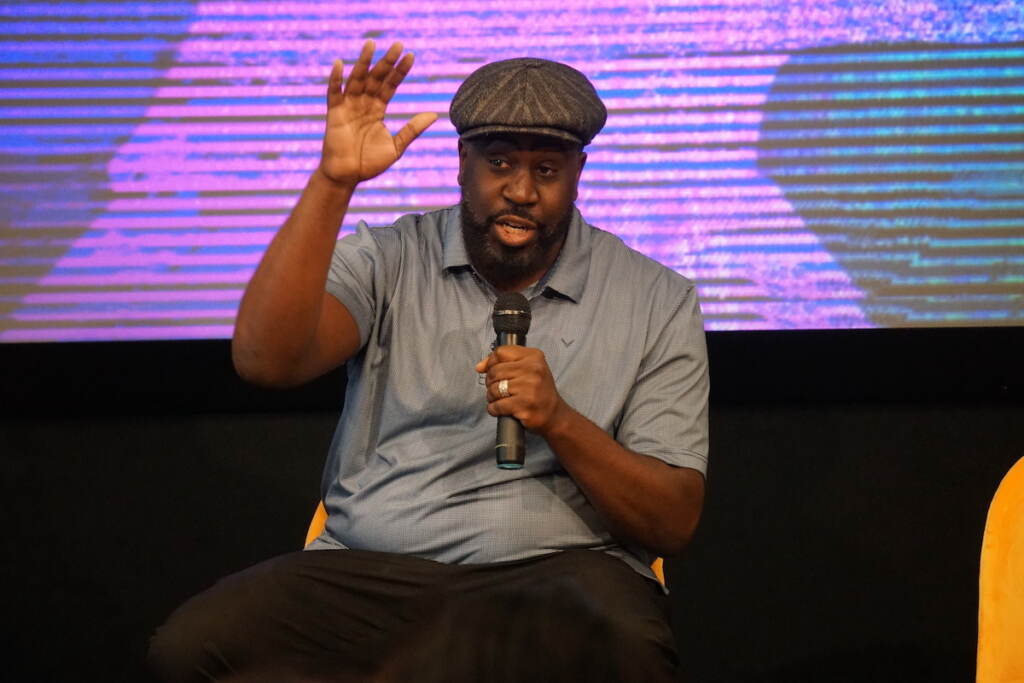
In response to the age-old question of whether the media causes violence, Kumanyika said that framing is missing important context — the structural forces that produce inequities and the “circumstances under which people turn to violence,” citing abolitionist scholar Ruth Wilson Gilmore. Communities that don’t suffer from intra-community violence have green spaces, more opportunities for young folks, and less policing, he said.
“I don’t think that the people who are trying to solve the problems are curious enough,” Kumanyika said.
The journalist said instead of telling youth not to listen to certain music, he advised educators to spark a conversation about what that music means to them or how it makes them feel — what’s the therapeutic element? And for instance, he said, for every song a young writer wants to make that includes what is considered “negative content,” encourage them to also write one with other “dimensions” to it.
“I think that the artists who do it the best, and artists like some of the people in the room, what they do differently that I think is sometimes what maybe the commercial venues might not like quite as much, is that they tell the whole story.”

Get daily updates from WHYY News!
WHYY is your source for fact-based, in-depth journalism and information. As a nonprofit organization, we rely on financial support from readers like you. Please give today.


